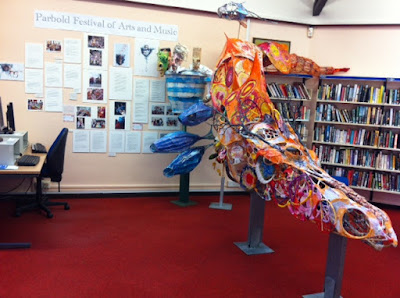I can't believe the Parbold Festival was nearly a month ago already. It was an amazing event, with over 8000 people visiting, taking part and helping to make it so brilliant.
There was something magical about the whole weekend. I have met and made friends with some incredible Parbold folk.
Here are just a few photographs. They don't do it justice, but they give a flavour of the community story that was performed over the festival weekend.
The crowd gathered in front of the open air stage behind The Railway pub waiting for the storytelling to begin. Children are holding the spirit guide fish that they made at visual art workshops with Andy and Sharon, the lead artists on the project. In the story, the spirit guides help a little girl, Tia, to search for the dragon who is late for the festival.
The story begins - here is local actor and singer Anna Beaumont bringing Tia's character to life, with help from our puppet Walter, operated by local puppeteer Phil King.
Three writers from the narrative workshops at the library read parts of the story that they have written. Excellent writing and performing from Izzie, Elaine and Lorraine (I wish I had a photo!) They are accompanied by our fantastic narrator Cath Foxon. The crowd listens in awesome silence, utterly compelled by the storytelling. Magical!
The procession through Parbold begins. We follow Tia and the spirit guides with flags and banners in search of the dragon.
We find the dragon. Tia greets Sunny the dragon and Parbold folk meet her as we make our way back through the village to the stage where the story of Sunny the Parbold dragon continues with a quest for fruit to feed a very hungry dragon.
On the final day of the festival, it is time for Sunny to return to her home inside Parbold Hill. We send her off with a lullaby and she makes her way back home via the canal. Wonderful boatman Keith, who is moored up in parbold, offers his boat for the job. Sunny is too big to lie across the top so here she is, her head at the front, and (off camera) her tail peeping out of the back of the barge. The bridge and canal bank are lined with Parbold folk waving goodbye to their dragon. A myth, a tall tale, brought to life in people's imaginations. You can see me in this picture (peeping out on the left), holding on to Sunny on the front, with Sharon and Andy.
It has been an incredibly special project to work on, with a brilliant team of creative people. I feel privileged to have played a part in the creation of a tall tale that we hope will return soon! The Parbold community is something very special and unique with so many talented creative people full of enthusiasm and ideas.
To see more pictures, see the
Parbold Festival Facebook page.
 I've been dreaming a lot recently. Not sure why... maybe it's mince pies and mulled wines too close to bedtime.
I've been dreaming a lot recently. Not sure why... maybe it's mince pies and mulled wines too close to bedtime.






















